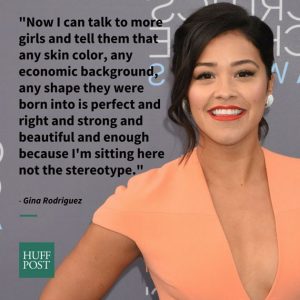¿Porque Me Oprimes? Latinx, Womxn, Education, & Empowerment
By Daisy Tucto
I want to start off by giving a huge shout out to, in my opinion, one of the greatest upbeat girl/self empowering anthems and music videos of all time by Bomba Estéreo called “Soy Yo”. The music video sets the stage of a young Latina walking the streets of her hometown after getting a new hairstyle to encapsulate a sense of newfound confidence, bravery to embrace, and realness as her body language displays her self-assurance. The lyrics talk about how you have to just keep going no matter what others think or the challenges and failures you face. The only thing that matters is what is within you. The chorus is my favorite part because it translates to saying don’t worry if they don’t approve, and when they criticize you just say ‘It’s Me”! Literally, I had flashbacks watching the music video again to when I first heard this song! My sister, who is a badass needless to say, introduced it to me; she is an admirable, independent, and fearless lesbian Latina! She has been the backbone of the person I am becoming today. Sometimes, I do pull on her on energy and courage to not care about what others think and say about me. Like the song, we would jam to it when it came out, even though I wasn’t really conscious about what the lyrics were about, the beat and vibe spoke to the truth: “Soy yo”.
Bomba Estéreo – Soy Yo (Official Video)
Born and raised in Chicago, like many others, by immigrant parent(s) was the beginning of an identity battle within myself and my family as powerful social influences hover over the youth of color in our segregated neighborhoods. So reading an excerpt called “La Conciencia de la Mestiza: Toward a New Consciousness” from Gloria Anzaldúa was very powerful because I felt everything she said as if it perfectly described how it feels to be trapped in between worlds, seeking acceptance from both but never fully receiving it. She put into words everything that I haven’t been able to. There is so much cultural collision, “Like all people, we perceive the vision of reality our culture communicates”, “La mestiza constantly has to shift out habitual formation; from convergent thinking, analytical reasoning that tends to use rationality to move toward a single goal (a Western mode), to divergent thinking, characterized by movement away from set patterns and goals and toward a more whole perspective, one that includes rather than excludes” (Gloria Anzaldúa, 1987). This makes me think about me attending St. Olaf College, a majority white private institution. Besides from having felt exclusion and “otherness” in my classes throughout my three and a half years on campus, you know how many of my uncles, cousins, aunts, etc. made fun of me that I would surely come back to Chicago after my first month in college? Or how I would be coming back pregnant? That all happened at my going away high school graduation party, and I remember going to my room to cry out of anger, embarrassment, and frustration. When I come back to Chicago, my family members always say “regreso la güera”, “ahora se cree la muy educada”, or “ahora vas a hacer mucho dinero [sarcastically]”. These constant remarks make me feel unaccepted by the worlds around me, as if be entering one I betrayed another, but how could I stay if I’m not welcomed? Or how could I stay knowing I can potentially help my family one-day? There are so many doubters of a young Latina from Chicago, who in their eyes, could never amount to her potential. Everyone thought I was never going to do it, and I hope I am not speaking too soon, but (in their faces) I’m a senior and plan on making it out to the end!

On top of it all, reading “The Woman’s Problem” by Domitila Barrios De La Chungara made me think about, I’m exhausted even to type it out, the gender oppression in Latin America, and everywhere for that matter. It’s not a surprise nor is it news. Domitila urges women to educate themselves politically and voice their complaints, insisting on women’s rights of not just the middle-class but working-class in labor and revolutionary movements. What really stood out is how conditioned we, women, are from the moment we are born to think of ourselves as incapable and inferior to men. It’s true, men are the head of the households, los muy machos y fuertes, right? I remember growing up, I used to see my dad connect the most with my half-brother the most, and I knew deep down inside it’s because he was a boy. And I am a girl. My brother was favored, and I was just there… to THIS day might I add. It’s pretty obvious where the value lies gender-wise. A part of me is so tired of trying to prove myself worthy and capable. I’m ready to just be like “It is what it is”, but another part of me is saying “What you gonna do about it”? So I’m trying, my best. One day I will reclaim and establish my identity without the oppression, permission, judgment, and input of others.
